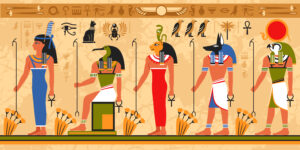“When you become the father of children and children’s children and have remained long in the land, and act corruptly, and make an idol in the form of anything, and do that which is evil in the sight of the LORD your God so as to provoke Him to anger, I call heaven and earth to witness against you today, that you will surely perish quickly from the land where you are going over the Jordan to possess it. You shall not live long on it, but will be utterly destroyed. The LORD will scatter you among the peoples, and you will be left few in number among the nations where the LORD drives you. There you will serve gods, the work of man’s hands, wood and stone, which neither see nor hear nor eat nor smell. But from there you will seek the LORD your God, and you will find Him if you search for Him with all your heart and all your soul. When you are in distress and all these things have come upon you, in the last days you will return to the LORD your God and listen to His voice” (Deut 4:25-30).
The importance of this passage for biblical theology can hardly be overstated. According to Deuteronomy 1:5, the function of Deuteronomy is to provide an interpretation of the law (i.e., the Sinai Covenant). And Deuteronomy 4:25-30 makes this interpretation explicit. Israel needs a new covenant! Moses calls heaven and earth to serve as his witnesses (see Deut 32:1) to the fact that Israel will break the Sinai Covenant (see Deut 31:16-21, 28-29), go into exile (see Deut 30:1), and miraculously return to God in the last days (see Deut 30:6; 32:43).
Israel’s prophets were not caught off guard nor did their worlds collapse when it happened
The critical importance of Deuteronomy 4:25-30 (and other passages like it, e.g., Deuteronomy 30-34) is clearly seen by the way it fueled the eschatological vision of Israel’s prophets. Because Moses had already prophesied about Israel’s future disobedience and exile, Israel’s prophets were not caught off guard nor did their worlds collapse when it happened. It only reinforced their certainty in Moses’ prophecies of the regathering of Israel in the last days, and the gift of a new heart and a new covenant (see Isaiah 40-55; Jeremiah 30-32; Ezekiel 36-37; Hosea 3:1-5).
Although Moses gave us the law, he is a prophet of and Israel’s greatest advocate for the New Covenant:
“When you are in distress and all these things have come upon you, in the last days you will return to the LORD your God and listen to His voice” (Deut 4:30).
“Moreover the LORD your God will circumcise your heart and the heart of your descendants, to love the LORD your God with all your heart and with all your soul, so that you may live” (Deut 30:6).










